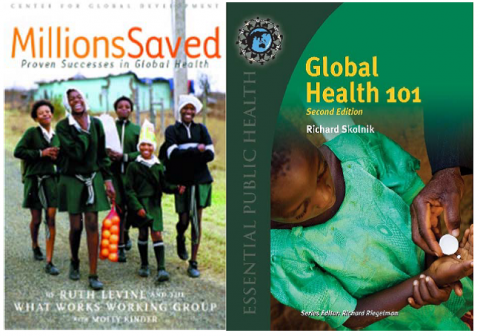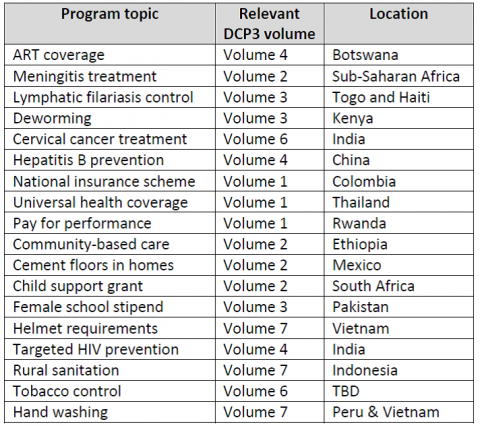
The Disease Control Priorities Network and the Center for Global Development (CGD), with support from the Bill & Melinda Gates Foundation, have embarked on a collaboration to produce an updated edition of Millions Saved: Proven Successes in Global Health. The review committee – of which DCP3 series editor Rachel Nugent is a member – is in the process of refining the list of possible case studies.
We are asking for further consideration from DCP3 editors and authors to help ensure a balanced set of programs that reflect the current burden of disease in low- and middle-income countries are included.
If you know of or are directly involved in case studies that demonstrate high impact on a global health condition or population, please submit a one or two-sentence summary of your proposed case study to:
Brianne Adderley, Project Coordinator
Disease Control Priorities Network
The review committee is particularly interested in including case studies that focus on DCP3 disease areas and populations. Below is a summary of the topics currently covered by the selected cases, and you can see that several DCP3 topics are not addressed.
We're asking you -DCP3 editors, authors, and contributors - to send us your ideas.
For example, cardio-metabolic and respiratory diseases (Volume 5) and metal health (Volume 8) are not currently represented in the selected case studies. Submission of candidate case studies on these particular topics is encouraged.

One of the reasons for the success of the original Millions Saved was the rigorous evidence of effectiveness in the chosen case studies. The first edition of Millions Saved, published in 2004, provided clear evidence that global health challenges, which are often perceived as daunting, are indeed solvable. The book was a best-seller and is still widely used in classrooms and development assistance agencies around the world. Millions Saved Third Edition aims to match the readable tone and rigor that characterized the earlier version by including cases that adhere to a specific set of criteria:
- IMPORTANCE: Interventions should address a problem of public health significance. In this case, mortality, morbidity, or another standardized measure such as burden of disease—disability adjusted life years (DALYs)—is useful as an indicator of importance, but other indicators such as equity or demand on health system resources may be considered.
- IMPACT: Interventions or programs should demonstrate a positive, significant and attributable impact on population health outcomes (morbidity and/or mortality), using a study design that employs impact evaluation approaches and methods. Demonstration of impact should be quantitative.
- ECONOMIC EVALUATION: Interventions should be highly cost-effective, as determined by a country-based threshold. Additional economic analysis, including cost-benefit and assessments of impact on non-health outcomes, such as financial protection or equity, are strongly desirable.
- DURATION: Interventions shall have functioned “at scale” for at least two years.
- SCALE AND GENERALIZABILITY: Interventions should be implemented on a significant scale. In some contexts, this will mean nationwide, but regional or other relevant population scales are acceptable. Programs may be characterized as “national” if they represent a national-level commitment, even if they target a health problem that affects only a limited geographic area or sub-group. Programs implemented on a pilot basis, or in small sub-national areas may be excluded.
We look forward to your suggestions of promising case studies that demonstrate “what works” in global health.



